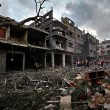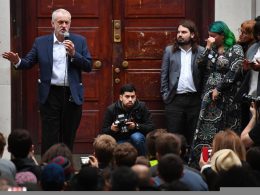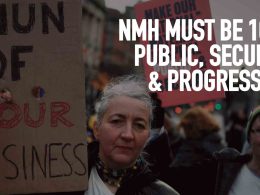By Serge Jordan
Dramatic events have shaken South Korea in the past 24 hours, plunging the country into a major political crisis. Right-wing President Yoon Suk Yeol declared martial law late Tuesday, accusing opposition parties of pro-North Korean sympathies and pledging to eliminate “anti-state elements”. Yet this desperate authoritarian gamble backfired spectacularly, as surging opposition and a call for an indefinite general strike by the country’s largest trade union forced him to rescind the order overnight.
Yoon, who assumed office in 2022, has faced major obstacles in advancing his conservative agenda. The opposition-controlled parliament, combined with growing societal discontent, has thwarted his ambitions. His People Power Party has been caught in a deadlock with the liberal opposition Democratic Party over next year’s budget bill, while his approval ratings have plummeted to a dismal 19%, according to the latest Gallup poll.
Public dissatisfaction has been mounting over a faltering economy, rising food prices, and attacks on democratic rights. On top of this, thousands of doctors have been striking for months, opposing government plans to expand medical school admissions. Meanwhile, Yoon has faced a series of scandals and arrogantly dismissed demands for independent investigations into corruption accusations involving his own wife, adding fuel to a wave of public outrage that earlier this year saw a petition for his impeachment become so popular that the parliamentary website hosting it momentarily crashed.
It was in this context that Yoon sought to impose martial law—a naked power grab aimed at silencing dissent and crushing opposition. Under the order, all political activities were banned, protests outlawed, and the media subjected to censorship. Martial law commander Park An-su issued the following statement:
“All political activities are banned in South Korea following the imposition of martial law on Tuesday and all media will be subject to government monitoring. All political activities, including those of the national assembly, local councils, political parties, and political associations, as well as assemblies and demonstrations, are strictly prohibited. All media and publications shall be subject to the control of the martial law command.”
Exposing the anti-working-class nature of this move, the military further decreed that striking doctors must return to work within 48 hours. In a grotesque Orwellian twist, Yoon justified this authoritarian clampdown as a measure to “protect the constitutional democratic order” and “guarantee the continuity of a liberal South Korea.” His rhetoric only underscored the shameless hypocrisy of a President determined to crush the very democratic principles he claimed to uphold.
Unsure in which direction the wind would blow, the White House opted for strategic ambiguity, stating only that it was “closely monitoring the situation” in South Korea. As a vital U.S. ally and a linchpin in countering Chinese and North Korean influence, South Korea’s stability is of paramount importance to Washington. Over 28,000 U.S. troops are permanently stationed there, highlighting its strategic value. Yet the U.S. government’s evasive reaction to Yoon’s dictatorial power grab, coming after a period of close geopolitical alignment with Yoon and of a supposed “shared vision of values-based diplomacy”, lays bare once again the hollow façade of U.S. imperialism’s pretensions to represent the side of democracy, human rights and the ‘rule of law’ in its global power battle against China.
Martial Law declaration backfires spectacularly
President Yoon Suk Yeol’s gambit to impose martial law has unraveled with breathtaking speed, exposing the fragility of his rule. This move proved to be a catastrophic miscalculation, as it relied on a base far too hollow to be sustained.
Dictatorial actions touch on a raw nerve in South Korea’s collective memory. The country endured 18 years under the military dictatorship of Park Chung-hee.
After Park’s assassination in 1979, a new military dictatorship emerged under Chun Doo-hwan —a man current President Yoon has made complimentary remarks about, claiming three years ago that the general had “done well in politics” apart from his coup and the crushing of protests. The most infamous event of Chun’s rule was the Gwangju Uprising of May 1980, during which military forces brutally suppressed pro-democracy protests, massacring hundreds if not thousands of civilians. In 1987, the June Democracy Movement mobilised millions across the country and ultimately ended military rule. For many South Koreans, particularly older generations, the memory of authoritarian rule and the hard-fought struggle for democratic rights remain vivid. The pervasive fear that authoritarian measures could signal a return to those dark days means that any move to curtail freedoms —like Yoon’s martial law— triggers alarm bells.
The backlash was immediate and overwhelming. Within hours of Yoon’s announcement, 190 of the 300 members of Parliament convened in an emergency session to pass a motion requiring martial law to be lifted. The vote was unanimous, even including 18 members of Yoon’s own People Power Party. Outside Parliament, thousands gathered, chanting slogans like “Lift martial law, protect democracy” and “Impeach President Yoon,” while police and army units blocked the building’s entrances. Han Dong-hoon, leader of the ruling party itself, publicly vowed to resist the imposition of martial law, declaring that he would stand “with the people.”
The tipping point came when the Korean Confederation of Trade Unions (KCTU), representing 1.2 million workers, announced an indefinite general strike until the martial law is abolished and Yoon Suk Yeol regime steps down. The specter of a paralyzed economy, of mass protests, and of opposition spreading within his own party forced Yoon to capitulate. By early Wednesday morning, he announced that martial law would be lifted, ordering troops stationed at the National Assembly to return to their barracks. The announcement was met with jubilant celebrations outside Parliament.
Yoon’s rule is now on borrowed time. An editorial in the Joongang Ilbo, a conservative newspaper, commented this morning,“The previously unthinkable discussion of the president’s impeachment has now become inevitable.” The opposition has called on the President to quit and be charged for treason, and has initiated impeachment procedures in the case he doesn’t resign voluntarily. Within his own party, cracks have deepened; the party leader apologized to the public, called for the defense minister to be fired, and urged the resignation of the entire cabinet. Reports have surfaced of Yoon’s senior aides —including his chief of staff and national security adviser— offering to resign en masse, underscoring the disintegration of his political base.
As this article is being written, the South Korean people have returned to the streets in greater numbers, refusing to relent until Yoon Suk Yeol is gone. According to The Guardians’ reporter in Seoul, “Expedited impeachment is the word on people’s lips.” Meanwhile the KCTU has vowed to continue the general strike until the President steps down entirely. Yoon’s ill-fated declaration of martial law has not only hastened the likely end of his presidency; it also appears to have reignited the collective power of the South Korean working class. The momentum generated by this struggle presents a rare opportunity that must be seized to build a broader mass movement—not just for the end of Yoon’s rule, but to address the deep-seated grievances and demands of South Korean workers and youth, including higher wages, a reversal of anti-labor policies, and decisive action to address the epidemic of gender-based discrimination and violence that has festered under Yoon’s administration.
Whereas Yoon’s attempted crackdown has been thwarted, it serves as a warning that as long as capitalism persists, democratic rights are never guaranteed —let alone genuine democracy, where the wealth created by society is no longer monopolized by corporate elites, and their system protected by political backers who hold state power.












